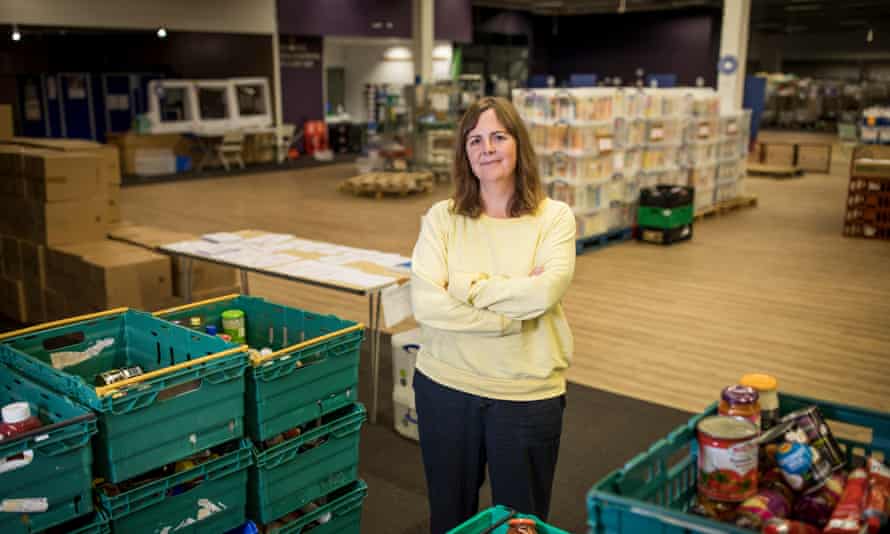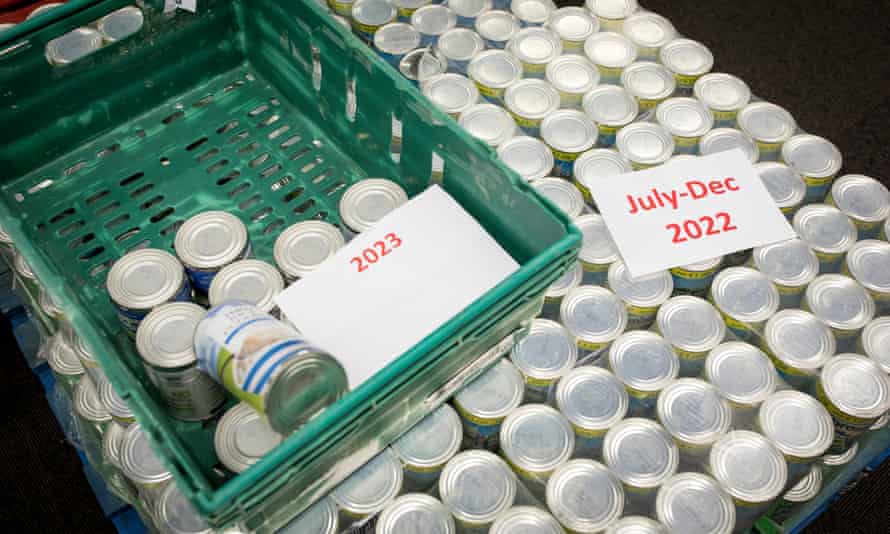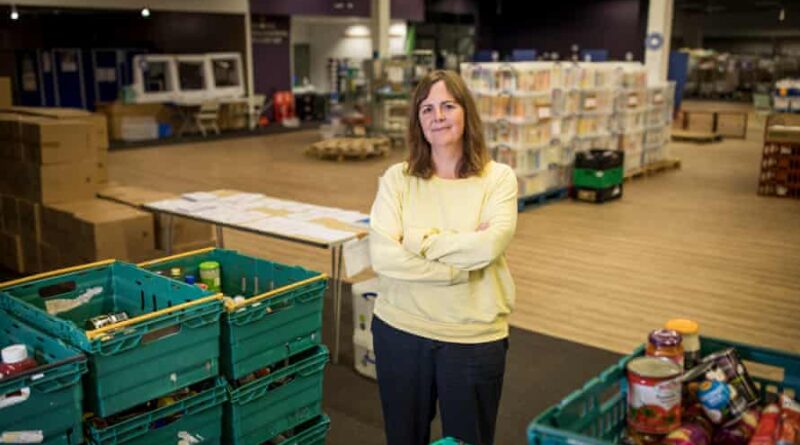Food bank supremo Emma Revie: ‘This is the best job in the world – and it shouldn’t have to exist’ | Food banks
Among the shiny glass and steel riverside developments in south-west London is a huge shed. It used to be Currys PC World; people still wander in looking for a washing machine or laptop. But now it’s full of food – donated food stacked in crates and plastic boxes.
I’m meeting Emma Revie, the CEO of the Trussell Trust, the network that supports more than 1,200 food bank centres around the UK, including this one. Revie, 45, volunteers here at Wandsworth food bank as well as running the umbrella organisation. There are also about 900 other independent food banks in the country. Food banks in the Trussell Trust network distributed 2.5m food parcels in the year to April 2021 – a third more than in the previous year. A million of those were for children.
Revie has heard people saying it so many times. “All I want to do is to be able to provide for my children and family, they say.” And she is hearing it more and more often.
“Parents try to mask it – we know that often they will skip meals multiple times before they come,” she says. “It’s actually at the point when they’re not sure how they are going to feed the kids that they come to a food bank.”
She has two children herself, aged 14 and 12. “I know that when they are hungry – and I mean between meals – it becomes something that they are fixated on. To experience hunger over a long period of time, the fear of not knowing where your food is going to come from, I think is all-pervasive for kids. It must be so difficult to engage in education, to keep your emotions under control.”
Wandsworth’s manager, Dan Frith, and its founder, Sarah Chapman, join us to show me around. It’s arranged like a kind of pop-up supermarket – rice and pasta over there, tins here, fruit, bags of spinach, washing-up liquid, loo roll, toiletries, pet food. There’s a box labelled “Kettle Only” for people housed (as part of the Everyone In programme to get homeless people off the streets) in B&Bs and hotels without cooking facilities. It contains things such as instant noodles, rice and couscous.
They had a tin of smoked oysters once. It went to a chef on a zero-hours contract, and made a lovely pasta dish, apparently. But the most exotic thing was probably an edible bikini. That didn’t go in a parcel – one of the volunteers took that one home. The only donation they really didn’t know what to do with was a tin of yacht varnish. Not a single one of their guests – they call the people who use the food bank guests – had a yacht that needed varnishing. It wasn’t wasted, though. They sold it on eBay for £30, and bought food with it.
Pre-Covid, people came into Trussell Trust food banks having been referred by a GP, social worker, mental-health team, Citizens Advice bureau or a school, and took home about three days’ worth of essential food. But since the pandemic, the food banks have been delivering to people’s homes, and they will continue to do so until September.

Later, I help out with a delivery. There’s still a shame and embarrassment about using food banks, says Frith. Chapman, who’s on deliveries today, using her own car (they also use by-the-hour rental vans), calls ahead to ask if anyone on the list of 10 or so deliveries is willing to talk to a journalist. Two agree.
So in Tooting, somebody welcomes us into her ground-floor flat. Lisa, 46, recently moved out of a difficult relationship; now she lives here with her 17-year-old son and is on universal credit. She gets £1,825 a month, which may sound like a lot, but the £1,534 rent for her privately owned flat comes out of that, leaving £291 for food, bills, everything else.
Lisa is the carer for her son, who has autism and attention deficit hyperactivity disorder, and they were getting an extra £64 a week personal independence payment (Pip), which made the difference between not coping and coping, but that was stopped. With the help of Citizens Advice, she’s challenging the Pip decision; the hearing is coming up.
She first used the food bank a month or so ago – pride prevented her coming earlier. “We all feel people will look down on us,” she says. “There’s a stigma behind it. But I’ve come to the conclusion: why should there be a stigma, because everyone is struggling?”
Even before Covid, food bank use was increasing alarmingly. In the year up to March 2020, food banks in the Trussell Trust network provided 1.9m food packages to people in crisis, up 18% on the previous year. Ten years ago, it was just 60,000.
Revie rolls off the reasons – years of freezes and benefits not keeping track with the cost of living, a significant reduction in the value of working-age benefits, the five weeks claimants have to wait before receiving any universal credit, “pushing them into debt and pushing them into food banks”.
“We know that, for the majority of people who come, the main source of income is the social security system, and what they say to us is that it isn’t enough to cover the basics.” And there are groups and communities – lone parents, people with disabilities, anyone with extra costs that are not covered – that are significantly over-represented.
Isn’t this catastrophic failure by the government? “This is a failure of our social security system, to keep up with the basic needs that people have in terms of their costs,” she says. “The erosion of the value of those benefits has led to the situation.”
She is not going to play the blame game, but she does admit: “It’s definitely in the gift of government to do something about it.” It’s a phrase she uses a few times – it’s in the gift of so-and-so to do something about it, an opportunity, when many people would say they should bloody well do it, should have bloody well done it already. Hers is a more diplomatic, CEO-style approach. She has regular dealings with the Department for Work and Pensions. “We share all our evidence; we regularly meet and advocate strongly for changes and uplift to universal credit and other changes to benefits.”
The pandemic hit the trust fast and hard. In the first two weeks of March 2020, demand was up 89% on the same period the previous year. Everything happened at once: supermarkets were being stripped; many food bank centres were too small for people to socially distance; a lot of volunteers were over 65 and shielding; many of the frontline organisations that refer people to food banks closed down.
“I remember thinking: I’m not sure our network is going to be able to keep going. But it was extraordinary. There was this position among volunteers and staff – we’re not not going to be providing food, we’re going to find a way through.”
They did. They rolled out a digital system so that agencies could refer clients to them, and distributed tablets to all the food banks. They got help, from supermarkets donating food, from companies with empty warehouses, from logistics companies and from 15,000 new volunteers. “It was extraordinary. Most days, I was weeping with joy … not joy, with awe. My hope is topped up to the top about people’s willingness to help their neighbours, to see that what they think is right is done, and to step forward.”
Revie was born in London, but moved to Perthshire when she was six months old. Her parents ran a business manufacturing jet washers; they were comfortable, but her dad had experienced extreme poverty when he was a kid, and would talk about it; about being hungry.
At university in Strathclyde, she got involved in the Jubilee 2000 Drop the Debt campaign, which called for cancellation of debts owed by developing countries. “It felt wrong that there were countries that were unable to afford debt repayments and were experiencing such levels of poverty. I’ve been there from quite a young age.” After uni, she worked at IBM for a couple of years to get some skills, and has been in the charity sector ever since. She has been in charge at the Trussell Trust since 2018.
She is concerned that her children have never lived in this country without food banks. “That’s really worrying to me: that it is becoming normalised, and that when someone loses their job or becomes unwell and is unable to afford food, the response is an emergency food parcel. We expect that our social security system would catch it … at the moment, too many people are falling through holes in that system and arriving at a food bank.”
But the horror of the past year has also brought hope. “We were all touched in some way – people we knew, people we’d heard of, people we’d never thought would become unwell, unable to work or lose their job. What the pandemic did was make us connected. It’s not a faceless group of people over there accessing social security – it’s my neighbour, my brother.”

Revie has been overwhelmed by the generosity and compassion she has witnessed: people volunteering and setting up collection points on their doorsteps; people simply refusing to accept that food banks are a dignified or acceptable solution. “We saw people responding, saying they could see it was needed, but also that this is not right, and that gives me a great deal of hope.”
For the country, these have been the most difficult circumstances since the second world war. “Last time it happened we had an incredible response in terms of the birth of the NHS. This is now a chance to redefine how we want to be. It’s a real moment for us – we’ve seen how we can care for one another during a pandemic, people stepping forward and doing incredible things. What are we going to call on our elected officials and ourselves to do differently as a nation?”
There’s background music wafting around the warehouse, perhaps retail muzak left behind by Currys PC World. It just so happens that at this point in our conversation Revie is accompanied by soaring strings. And that feels right – it’s a stirring appeal to build back better, not as a hollow political slogan, but a genuine call and a belief: “We can build a hunger-free future, a future where people don’t have to come to food banks.”
Of course, that would put her out of work, but she’s OK with that. “There are so many paradoxes in this job, actually.” It’s the best job in the world because of the staff and volunteers, and the worst because it shouldn’t have to happen. They are having to increase provision at the same time as working on strategies to end it. They want to be welcoming, they also want to be saying – in the nicest possible way – we hope to never see you again.
Has she found the same community spirit and compassion from the government as she has from the people? In some ways, yes, she says. “I think you move into public service because you believe in community. I think it’s a very difficult job to be an MP and not be committed to community.”
Really? What about the PM – does she think he is committed to the idea of community? “I believe he is committed to community. I think I would want to work with him on how we can ensure that is the experience of everyone in the country and that no one is left behind.” Revie’s not going to slag off anyone.
Back on the deliveries, and on to a low-rise estate in north Battersea, in the shadow of the luxury development of Battersea power station. Eleanora, 29, lost her job as a chef early last year, before furlough. She didn’t go straight on to universal credit, didn’t want to be a burden on the system – she used up her savings, found some part-time work as a carer, but it wasn’t enough to cover food and rent.
Eleanora has diabetes; she wasn’t eating regularly or well, and it was affecting her health. When she was on the phone to the jobcentre, her work coach asked her if she needed help with food. “I come from a family that never had to use any benefits of any sort, so my initial thought was no. But then I was like, oh my God, you know what? I do need help.”
Eleanora’s pretty sure it’s going to be short term for her – she can see a way out. She’s going to be moving to Durham in September; she’s got a place at university there, reading Chinese studies.
Earlier, Revie had talked about the importance of learning from the people who came to the food banks. “We know that, within our network, many of our volunteers are people who have themselves had to use food banks in the past and as a result of the service wanted to contribute to it,” she said.
And Eleanora is an example of that. As we’re leaving, she tells Sarah she would be free the following week to come in to the Wandsworth food bank. Not as a guest, but to help out.

